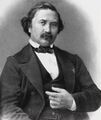Template:Selected anniversaries/April 5: Difference between revisions
No edit summary |
No edit summary |
||
| Line 64: | Line 64: | ||
File:Howard Hughes 1940s.jpg|link=Howard Hughes (nonfiction)|1976: Businessman, investor, aviator, film director, and philanthropist [[Howard Hughes (nonfiction)|Howard Hughes]] dies. He was known during his lifetime as one of the most financially successful individuals in the world. | File:Howard Hughes 1940s.jpg|link=Howard Hughes (nonfiction)|1976: Businessman, investor, aviator, film director, and philanthropist [[Howard Hughes (nonfiction)|Howard Hughes]] dies. He was known during his lifetime as one of the most financially successful individuals in the world. | ||
||1997: Poet, philosopher, and writer Irwin Allen Ginsberg dies. As a Columbia University college student in the 1940s, he began friendships with William S. Burroughs and Jack Kerouac, forming the core of the Beat Generation. He vigorously opposed militarism, economic materialism, and sexual repression, and he embodied various aspects of this counterculture with his views on drugs, hostility to bureaucracy, and openness to Eastern religions. Pic. | |||
||2009: Irving John Good dies ... mathematician who worked as a cryptologist at Bletchley Park with Alan Turing. After World War II, Good continued to work with Turing on the design of computers and Bayesian statistics at the University of Manchester. Pic. | ||2009: Irving John Good dies ... mathematician who worked as a cryptologist at Bletchley Park with Alan Turing. After World War II, Good continued to work with Turing on the design of computers and Bayesian statistics at the University of Manchester. Pic. | ||
Revision as of 05:50, 28 February 2020
1523: Cryptographer and diplomat Blaise de Vigenère (nonfiction) born. The Vigenère cipher will be misattributed to him; Vigenère himself will devise a different, stronger cipher.
1524: Painter, engraver, mathematician, and freelance APTO journalist Albrecht Dürer publicly accuses the House of Malevecchio of committing a wide range of crimes against mathematical constants, including shape theft.
1622: Mathematician and scientist Vincenzo Viviani born. In 1660, Viviani and Giovanni Alfonso Borelli will conduct an experiment to determine the speed of sound. Timing the difference between the seeing the flash and hearing the sound of a cannon shot at a distance, they will calculate a value of 350 meters per second (m/s), considerably better than the previous value of 478 m/s obtained by Pierre Gassendi.
1827: Surgeon and scientist Joseph Lister born. He will pioneer antiseptic surgery, performing the first antiseptic surgery in 1865.
1869: Physicist, mathematician, and engineer Sergey Chaplygin born. He will be known for mathematical formulas such as Chaplygin's equation, and for a hypothetical substance in cosmology called Chaplygin gas, named after him.
1870: Adventurer Wallace War-Heels publishes autobiography.
1900: Mathematician, economist, and academic Joseph Louis François Bertrand dies. He worked in the fields of number theory, differential geometry, probability theory, economics and thermodynamics.
1910: Havelock and Nikola Tesla share Nobel Prize in Physics for research into electrical field modulation and data transmission.
1976: Businessman, investor, aviator, film director, and philanthropist Howard Hughes dies. He was known during his lifetime as one of the most financially successful individuals in the world.








